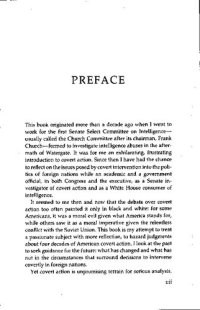
Ebook: Covert Action: The Limits of Intervention in the Postwar World
Author: Gregory F. Treverton
- Year: 1987
- Publisher: I.B. Tauris
- Language: Chinese
- pdf
In the last 30 years the United States has spent billions of dollars on “secret” intervention throughout the world. These covert actions - few of which have remained secret for long - include everything from propaganda and infiltration of political parties to clandestine arms sales and full-blown paramilitary operations.
This book is the first to analyse the political and administrative dimension of the CIA’s activities in Iran, Guatemala, Cuba, Chile, Nicaragua, Southern Africa, the Middle East, Southeast Asia and elsewhere. It demonstrates that the planning and execution of covert action has changed over the course of time. It also assesses how effective covert action has been in accomplishing the USA’s foreign policy objectives.
Gregory Treverton raises here a number of questions of crucial importance in a democracy. How, in an open society, can covert action be kept secret? To whom should intelligence agencies be accountable? What role should elected officials play? And, with the wisdom of hindsight: has the CIA’s poor record of real long-term achievement - and lack of control over operations once started—justified the subversion of the legal process which often flows from intelligence operations?
As well as providing fascinating insights into how the CIA works, this book offers a timely explanation of official thinking on Iran/Contragate, and why the Reagan administration operated independently of the CIA when dealing with Iran.
This is a key work on one of the most controversial subjects in international relations, written by an expert with an insider’s knowledge.
This book is the first to analyse the political and administrative dimension of the CIA’s activities in Iran, Guatemala, Cuba, Chile, Nicaragua, Southern Africa, the Middle East, Southeast Asia and elsewhere. It demonstrates that the planning and execution of covert action has changed over the course of time. It also assesses how effective covert action has been in accomplishing the USA’s foreign policy objectives.
Gregory Treverton raises here a number of questions of crucial importance in a democracy. How, in an open society, can covert action be kept secret? To whom should intelligence agencies be accountable? What role should elected officials play? And, with the wisdom of hindsight: has the CIA’s poor record of real long-term achievement - and lack of control over operations once started—justified the subversion of the legal process which often flows from intelligence operations?
As well as providing fascinating insights into how the CIA works, this book offers a timely explanation of official thinking on Iran/Contragate, and why the Reagan administration operated independently of the CIA when dealing with Iran.
This is a key work on one of the most controversial subjects in international relations, written by an expert with an insider’s knowledge.
Download the book Covert Action: The Limits of Intervention in the Postwar World for free or read online
Continue reading on any device:

Last viewed books
Related books
{related-news}
Comments (0)